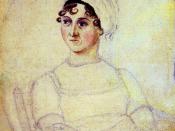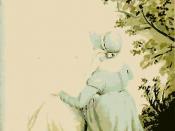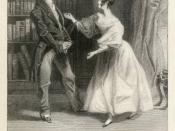Simon Langton's Pride and Prejudice reflect and challenge the values and attitudes of the 19th century through adaptation and appropriation of Jane Austen's novel. Time is an unchangeable force, and with time comes reflection of values, knowledge, and attitudes of the past towards themes common through time. As a result of changing context, it is expected that a contemporary audience will tire of the older texts and thus Langton reappropriates the 19th century novel to suit the preferences of today's society. He presents the audience of a 21st century context, characterised by industrialism, consumerism and urbanism, with a mini-series which conveys his intended meaning through satire. The audience is positioned and repositioned to reflect on the relevance of the social arrangements in today's context.
Austen presented her satire through the characters by generous amounts of dialogue (including the letters), loose sentences; conveying the motives of the inner most thoughts of the characters, and periodic sentences; which form logically sequenced and firmly stated views.
Langton, whilst presenting to the audience a narrative perspective without the aid of the written word, had to rely on visual symbolism such as gesture, posture, and body language, as well as film techniques in order to communicate his meaning. His "Pride and Prejudice" reflected the universal themes from the 19th century and from today's context, whilst also showed the change in position of the values and attitudes of the audience through social structure, reasons for marriage, and social etiquette.
Langton showed the tension during the 19th century where rights and responsibilities of the individual started to question the conservative conceptions of gender and class relations in a rigid society. Elizabeth Bennet, as the female protagonist, personifies the challenge posed by individualism to the authority of the stratified society. Although well aware of the rules...



Make Langton proud...
Very helpful in my own analysis. Thank you.
0 out of 0 people found this comment useful.